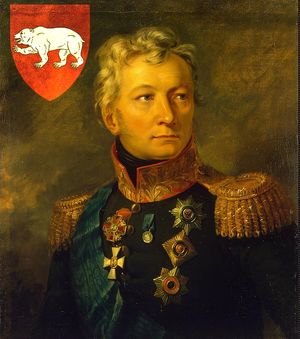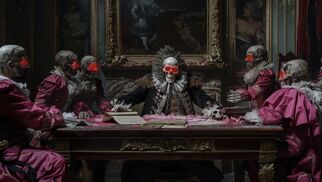André Vales: Difference between revisions
(Created page with "'''André Vales''' (1635 - ...) was a discoverer and self-styled ''conquistador''. He was instrumental in the establishment of the Duchy of Leylstadt, as he undertook four...") |
No edit summary |
||
| (8 intermediate revisions by 5 users not shown) | |||
| Line 1: | Line 1: | ||
'''André Vales''' (1635 - ...) was | {{Woodrow Article}} | ||
[[File:Andre Vales.png|300px|thumb|right|André Vales, as ''Knight of the White Bear'' in 1675 AN.]] | |||
'''André Vales''' (1635 - ...) was an explorer and self-styled ''conquistador''. He was instrumental in the establishment of the [[Duchy of Leylstadt]], as he undertook four expeditions - the so-called ''Valesian Expedition'' - between 1664 and 1674 AN to what later became the Duchy. Vales is of Aldurian and Batavian descent, and received Leylstadter citizenship. In Hurmu, he is by birth, [[Knight of the Holy Lakes]]. His actions gave him a sort of saintly status within the local religious community and he was soon seen as patron saint of adventurers, scientists and opportunists. | |||
==Rise to Power== | |||
In 1675 AN he received the title of ''Knight of the White Bear'' for his aid in the development of Leylstadt. Eventually, the collapse of Leylstadt prompted a new chapter in Vales’ life. Declining an invitation to reside in [[Jingdao]], he instead focused on the burgeoning opportunities in [[Tiě Gǎng|Tiegang]]. When Jingdaoese forces vacated the region, Vales played a crucial role in establishing the [[International Mandate for the Settlements in Apollonia]] in 1687 AN. His leadership and charisma saw him unanimously elected as the First Consul of the Mandate, a position he has held unopposed ever since. | |||
==The Consulship and Unraveling Mysteries== | |||
Despite his apparent popularity and enduring legacy (winning elections every four years), the latter years of Vales’ rule have been shrouded in mystery and suspicion. By the late 1730s, disturbing rumors and reports began to surface, hinting at a dark transformation within the Consul’s administration. Observers noted an overwhelming stench of incense perpetually emanating from the Consul's Palace, coupled with the eerie presence of men and women dressed in pink (why should it always have to be black?), shadowing Vales wherever he went. This ominous entourage fueled speculation that Vales was under the influence of a sinister cult. | |||
Further deepening the intrigue, whispers emerged suggesting that Vales had long since perished, his corpse allegedly preserved and manipulated by shadowy figures from the elite circles, possibly orchestrated from the infamous Blackfriars' Redux pub. This macabre theory posits that the once vibrant and heroic Vales had been reduced to a mere puppet, his legend and symbolic presence exploited to maintain control over the city-state. | |||
==The Blackfriars' Redux Conspiracy== | |||
[[File:Andres Vales and the cult.jpg|left|thumb|322x322px|Artistic interpretation by a troubled artist. ''There is nothing wrong within Tiegang.'']] | |||
The [[Blackfriars' Redux|Blackfriars' Redux pub]], a notorious hub for the city's intellectual and political elite, has long been rumored to be the epicenter of [[Mei Ling|covert power plays]] and clandestine meetings. It is within this chaotic environment that the alleged puppet masters of Vales’ corpse are said to convene, drafting decrees and laws under the guise of boisterous debate and drunken revelry. This informal yet influential governance structure blurs the lines between legitimate rule and manipulative control. | |||
[[category:Leylstadt]] | [[category:Leylstadt]] | ||
[[Category:people]] | |||
[[Category:Living members of the Order of the Holy Lakes]] | |||
[[Category:International Mandate]] | |||
Latest revision as of 21:47, 10 July 2024
André Vales (1635 - ...) was an explorer and self-styled conquistador. He was instrumental in the establishment of the Duchy of Leylstadt, as he undertook four expeditions - the so-called Valesian Expedition - between 1664 and 1674 AN to what later became the Duchy. Vales is of Aldurian and Batavian descent, and received Leylstadter citizenship. In Hurmu, he is by birth, Knight of the Holy Lakes. His actions gave him a sort of saintly status within the local religious community and he was soon seen as patron saint of adventurers, scientists and opportunists.
Rise to Power
In 1675 AN he received the title of Knight of the White Bear for his aid in the development of Leylstadt. Eventually, the collapse of Leylstadt prompted a new chapter in Vales’ life. Declining an invitation to reside in Jingdao, he instead focused on the burgeoning opportunities in Tiegang. When Jingdaoese forces vacated the region, Vales played a crucial role in establishing the International Mandate for the Settlements in Apollonia in 1687 AN. His leadership and charisma saw him unanimously elected as the First Consul of the Mandate, a position he has held unopposed ever since.
The Consulship and Unraveling Mysteries
Despite his apparent popularity and enduring legacy (winning elections every four years), the latter years of Vales’ rule have been shrouded in mystery and suspicion. By the late 1730s, disturbing rumors and reports began to surface, hinting at a dark transformation within the Consul’s administration. Observers noted an overwhelming stench of incense perpetually emanating from the Consul's Palace, coupled with the eerie presence of men and women dressed in pink (why should it always have to be black?), shadowing Vales wherever he went. This ominous entourage fueled speculation that Vales was under the influence of a sinister cult.
Further deepening the intrigue, whispers emerged suggesting that Vales had long since perished, his corpse allegedly preserved and manipulated by shadowy figures from the elite circles, possibly orchestrated from the infamous Blackfriars' Redux pub. This macabre theory posits that the once vibrant and heroic Vales had been reduced to a mere puppet, his legend and symbolic presence exploited to maintain control over the city-state.
The Blackfriars' Redux Conspiracy
The Blackfriars' Redux pub, a notorious hub for the city's intellectual and political elite, has long been rumored to be the epicenter of covert power plays and clandestine meetings. It is within this chaotic environment that the alleged puppet masters of Vales’ corpse are said to convene, drafting decrees and laws under the guise of boisterous debate and drunken revelry. This informal yet influential governance structure blurs the lines between legitimate rule and manipulative control.

